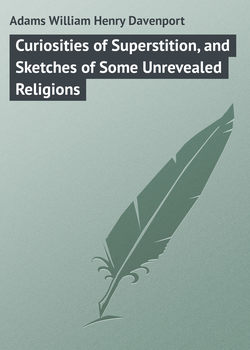Curiosities of Superstition, and Sketches of Some Unrevealed Religions

Реклама. ООО «ЛитРес», ИНН: 7719571260.
Оглавление
Adams William Henry Davenport. Curiosities of Superstition, and Sketches of Some Unrevealed Religions
CHAPTER I. BUDDHISM: ITS ORIGIN AND CEREMONIES
CHAPTER II. MAGIANISM: THE PARSEES
CHAPTER III. JEWISH SUPERSTITIONS
CHAPTER IV. BRAHMANISM
CHAPTER V. THE HINDU MYTHOLOGY: AND THE VISHNU PURANA
CHAPTER VI. IN CHINA: – CONFUCIANISM, TAOUISM, AND BUDDHISM
CHAPTER VII. AMONG THE MALAYS: THE SLAMATAN BROMOK; THE DYAKS; THE PAPUAN TRIBES; THE AHETAS
CHAPTER VIII. THE SAVAGE RACES OF ASIA: THE SAMOJEDES; THE MONGOLS; THE OSTIAKS; IN TIBET
CHAPTER IX. SOME AFRICAN SUPERSTITIONS
CHAPTER X. THE ZULU WITCH-FINDERS
CHAPTER XI. ZABIANISM AND SERPENT-WORSHIP
CHAPTER XII. POLYNESIAN SUPERSTITIONS
CHAPTER XIII. THE FIJI ISLANDERS
CHAPTER XIV. THE RELIGION OF THE MAORIES
CHAPTER XV. THE NORTH AMERICAN INDIANS
CHAPTER XVI. AMONG THE ESKIMOS
CHAPTER XVII. A MEDIÆVAL SUPERSTITION: THE FLAGELLANTS
CHAPTER XVIII. SCOTTISH SUPERSTITIONS: HALLOWEEN
CHAPTER XIX. SECOND SIGHT: DIVINATION: UNIVERSALITY OF CERTAIN SUPERSTITIONS: FAIRIES IN SCOTLAND
Отрывок из книги
When the pure morality of Christianity is adduced as a proof of its high origin, one of the favourite devices of Modern Unbelief is to claim an equally high standard for the morality inculcated by the primitive creeds, and to rain praises upon the ethical systems embodied in the Soûtras of the Buddhists, the Rig-Veda of the Brahmans, or the Zendavesta of the Parsees. In making this claim our philosophers probably calculate on the little knowledge which the multitude possess of any creeds but their own. They are well aware that, to the popular mind, the teaching of Buddha or Zoroaster is necessarily a sealed book, and that the whole extent of its purport is known only to a few scholars. Hence, when they come to support their thesis by quotations, they are able to select those isolated passages which shine with the lustre of genuine diamonds, and produce an absolutely false impression of the general character of the writings in which they occur; thin veins of precious metal shining here and there through masses of worthless ore. No doubt the Veda contains numerous utterances of the highest beauty, in which the soul’s devotion to a Supreme Power is expressed with a lyrical fervour inferior only to that of the Sweet Singer of Israel. No doubt the Zendavesta, or the books of K’ung-fu-tze, like the works of later and maturer intellects – a Xenophon and a Plato, a Seneca and a Marcus Aurelius – are enriched with thoughts of the loftiest description, and frequently breathe the most exalted aspirations. But what we have to remember is, that these are wholly exceptional; that they are the most arduous efforts of each self-absorbed thinker, and the indications of his boldest flights. At other times the wing grows feeble; at other times the music is faint and even discordant; the bird can do no more than creep along the ground. In the sayings of our Lord, however, or in the writings of His Apostles, the tone is always sustained, clear, definite. There is no uncertainty or hesitation. Nothing mean or unworthy is woven in their texture. No concessions are made to man’s coarser desires or grosser passions. The system set before us is rounded in perfection, and shows not a flaw from beginning to end. We feel that He who speaks, whether in His own Person or through His disciples, speaks as never man spoke before; and that the Voice which fills our ears and stirs our hearts is, in deed and in truth, a Voice from Heaven.
We propose to furnish in this chapter a general view of the construction and teaching of the Parsee Scriptures, with the view of showing the signal inferiority of the creed it embodies to Christianity in all that can elevate the mind and satisfy the soul. At the same time we admit that the Parsee creed, and all similar creeds, possess an intrinsic value, apart from their ethical deficiencies, as illustrating the recognition of an Almighty Will, an Eternal and Supreme Force, by all the higher races of mankind. They show us the hopes, fears, and desires of great tribes and peoples which existed in the days before men wrote history; and they show us how their wisest teachers groped in the dark, and stumbled in the thorny path, – favoured occasionally, it is true, with a wonderful glimpse of light, and striking now and again into the pleasant places, but never rejoicing in the glory which rose upon earth with the Sun of Righteousness, never treading in that narrow but secure way which leads to Eternal Life. We see in them the great minds of the early world, like children on the seashore, perplexed by a music which they could not comprehend, and astonished by a power which they were unable to define. Yet happier and wiser they than the cold materialist of a later age, who resolves all mysteries, all phenomena, into the working of a blind inflexible Law, and takes out of creation its light, beauty, and joy by denying the existence of an all-powerful and all-loving Creator.
.....
And again:
We know the form of prayer taught us by Jesus Christ; how simple it is, how complete, how absolute in its renunciation of self, how comprehensive in its charity. “Thy will be done”… “Forgive us our trespasses as we forgive them who trespass against us”… “Lead us not into temptation.” Such are its leading thoughts: submission before God, charity before Man; both implying and demanding the conquest and humiliation of self. Let us contrast it with a Zarathustrian prayer:
.....